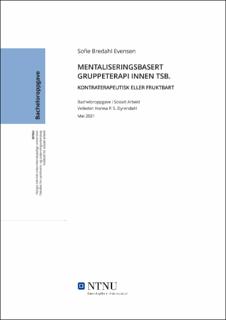| dc.contributor.advisor | Dyrendahl, Hanna P. S. | |
| dc.contributor.author | Evensen, Sofie Bredahl | |
| dc.date.accessioned | 2021-09-28T18:48:22Z | |
| dc.date.available | 2021-09-28T18:48:22Z | |
| dc.date.issued | 2021 | |
| dc.identifier | no.ntnu:inspera:79529603:16615608 | |
| dc.identifier.uri | https://hdl.handle.net/11250/2785781 | |
| dc.description.abstract | Mentaliseringsbasert terapi (MBT) er utviklet for behandling av borderline personlighetsforstyrrelse, men har etter god effekt de senere år blitt overført også til andre behandlingsarenaer, eksempelvis tverrfaglig spesialisert rusbehandling. Behandlingsformen tilbys både som individualterapi og gruppeterapi, samt i kombinasjon. Studiens formål er å undersøke hvordan kombinasjonen av mentaliseringsbasert terapi og grupperettet terapi kan forbedre behandlingstilbudet til rusmiddelavhengige. Oppgaven bygger hovedsakelig på litteraturstudie som metode, men det anvendes også tilleggslitteratur. Resultatene viser til en hovedvekt av forskning som taler for at bruk av mentaliseringsbasert terapi og gruppeterapi vil gi god effekt. Forskning viser at kombinasjonsbehandling ved bruk av gruppeterapi og individualterapi bedrer behandlingstilbudet. Gruppeterapi byr på en komplisert dynamikk hvor usynkrone dialoger og motstridende meninger utfordrer brukerne ytterligere. Hovedvekten av funnene viser til at dette bidrar til selvutvikling i større grad. Sentralt i denne sammenheng trekkes rusmiddelavhengiges mistillit inn som begrensende, og samhold og støtte fra gruppen som fordelaktig.
Mentaliseringsbasert terapi hjelper emosjonelt ustabile mennesker til økt mentaliseringsevne og sosial kompetanse. Metoden viser gode resultater knyttet til symptomlette på blant annet impulsiv atferd og depresjon. Gjennom å styrke individenes mentaliseringsevne bidrar MBT til økt følelsesregulering, og forhindrer i så måte individer fra å havne i mentaliseringssvikt. Behandlingsformen viser også til en reduksjon i antall suicidforsøk, hvilket er forhøyet hos mennesker med rusmiddelavhengighet. | |
| dc.description.abstract | Mentalization-based treatment (MBT) was originally developed for the treatment of borderline personality disorder but has due to promising results been established across several clinical presentations. MBT is presented as both individual therapy and group therapy, as well as the two combined. This study reviews mentalization-based group therapy within interdisciplinary, specialized treatment for addiction. The aim of this study was to investigate whether the combination of mentalization-based therapy and group therapy would improve the treatment given to people with substance abuse. The thesis is mainly based on a systematic literature review but is supplemented by additional literature of relevance. The results presented reveals that most studies on the subject are in favor of using MBT and group therapy. Studies show that the outcome of treatment is improved in cases where individual- and group therapy are combined. Group therapy challenges the individual on a bigger scale due to unsynchronized dialogues and the complex dynamic it creates. Results confirm that these factors contribute to self-development. Group therapy also creates a space for support and unity which is an advantage for evolving, but on the other hand the efficiency is limited by substance abusers struggle with trust.
Mentalization-based treatment’s core focus is to improve the dysfunction of self-regulation that we often see in emotionally unstable people. By helping the individuals increase their ability to mentalize results show a decrease in impulsive behavior, depression, and suicide attempts. MBT contributes to stabilizing emotional expression and maintaining an optimal state of mind, avoiding lapses in mentalization. | |
| dc.language | nob | |
| dc.publisher | NTNU | |
| dc.title | MENTALISERINGSBASERT GRUPPETERAPI INNEN TSB.
KONTRATERAPEUTISK ELLER FRUKTBART | |
| dc.type | Bachelor thesis | |
